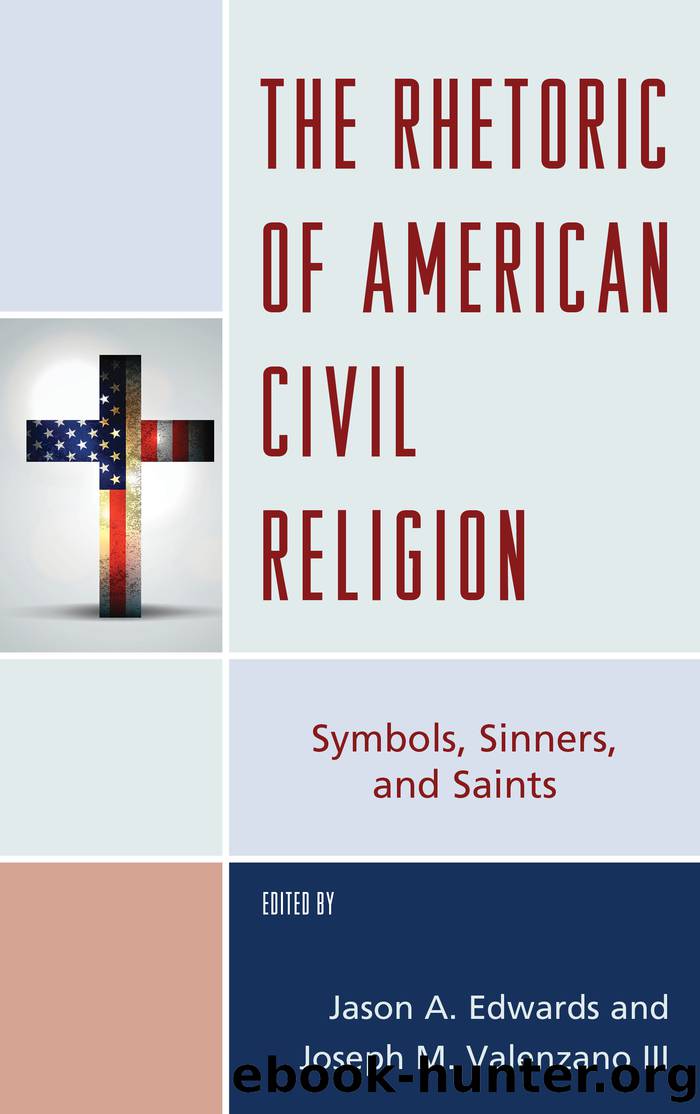The Rhetoric of American Civil Religion by unknow

Author:unknow
Language: eng
Format: epub
Tags: undefined
Publisher: Lexington Books/Fortress Academic
Published: 2012-08-15T00:00:00+00:00
The common thread between this story and the previous one is an economic reward for behavior that reflects a Christian worldview, linking Godâs approval with financial reward. This logic works backward as well. Pealeâs instantiation of this morality creates the implication that those who are successful financially likely got that way through their good moral behavior. Thus, by arguing that Christian virtue leads to financial success, his ideology casts successful capitalists not just as economically successful, but also as morally righteous.
Other narratives underscore the implicit assumption that successful business people are ideal models of spiritual success. Peale writes, âOne of my most inspiring friends was the late Harlowe B. Andrews of Syracuse, New York, one of the best businessmen and competent spiritual experts I ever knew.â[33] In another example, he talks to a physician about a man who âworks from morning until night without interruption, but always seems able to assume new obligations.â This ability is credited to his religiosity, because âfrom his religion he has learned how to avoid drainage of power.â[34] While the first example merely presents spiritual and business success in parallel, the second directly claims that spiritual knowledge leads to tireless ability to work. This reinforces the same implications: spiritual righteousness is rewarded by capitalism, and those who succeed do so because of their spiritual virtue. This connection is important, because it explains how American civil religion envelops American economic culture. Rhetors like Peale build the connection partly by trying to make religious values relevant in a capitalist society, but wind up generating a durable articulation that works to the advantage of capitalism as much as it does to promote Christian beliefs.
One bit of evidence that Peale is perhaps most interested in promoting Christianity to capitalists is the way that he employs the terminology of consumer products to depict Christianity, constructing identification through overlapping metaphors. Like the products and appliances that were taking off in the burgeoning market of the 1950s, Peale talks about Christianity with words like âscientificâ and âup to date.â In the modern and polished office of one man Peale admires there is also âan old battered copy of the Bible.â Peale reports its owner claiming, âThat book is the most up-to-date thing in this plant . . . so far ahead of us that it never goes out of date.â[35] For another man who undermined himself with negative thoughts, Peale found âthe solution to this problem in the simple techniques of faith taught in the Bible. These principles are scientific and sound and can heal any personality of the pain of inferiority feelings.â[36] Prayer is a technique that benefits from breakthrough findings, Peale elsewhere claims, because ânew and fresh spiritual techniques are being constantly discovered by men and women of spiritual genius. It is advisable to experiment with prayer power according to such methods as prove sound and effective.â[37] In all of these cases, religion is cast as âmodernâ and âscientificâ much like engineering and production methods. It seems odd to use
Download
This site does not store any files on its server. We only index and link to content provided by other sites. Please contact the content providers to delete copyright contents if any and email us, we'll remove relevant links or contents immediately.
Getting It, Then Getting Along by L. Reynolds Andiric(653)
Religion and Politics Beyond the Culture Wars : New Directions in a Divided America by Darren Dochuk(575)
Global Justice, Christology and Christian Ethics by Lisa Sowle Cahill(428)
Positive Psychology in Christian Perspective: Foundations, Concepts, and Applications by Charles Hackney(354)
Forgiveness and Christian Ethics by Unknown(347)
Douglas Hamp The First Six Days by Unknown(296)
The Horrors and Absurdities of Religion by Arthur Schopenhauer(271)
Insurgency, Counter-insurgency and Policing in Centre-West Mexico, 1926-1929 by Mark Lawrence(266)
Middle Eastern Minorities: The Impact of the Arab Spring by Ibrahim Zabad(250)
Christian Martyrdom and Christian Violence by Matthew D. Lundberg;(242)
The Oxford Handbook of Greek and Roman Mythography by R. Scott Smith;Stephen M. Trzaskoma;(235)
Beyond Heaven and Earth by Gabriel Levy(232)
God and Eros by Patterson Colin;Sweeney Conor;(230)
The Bloomsbury Reader in Christian-Muslim Relations, 600-1500 by David Thomas;(223)
Autobiography, Volume 2: 1937-1960, Exile's Odyssey by Mircea Eliade(215)
Witches: the history of a persecution by Nigel Cawthorne(211)
Cult Trip by Anke Richter(210)
An Introduction to Kierkegaard by Peter Vardy(198)
The Global Repositioning of Japanese Religions by Ugo Dessi(195)
